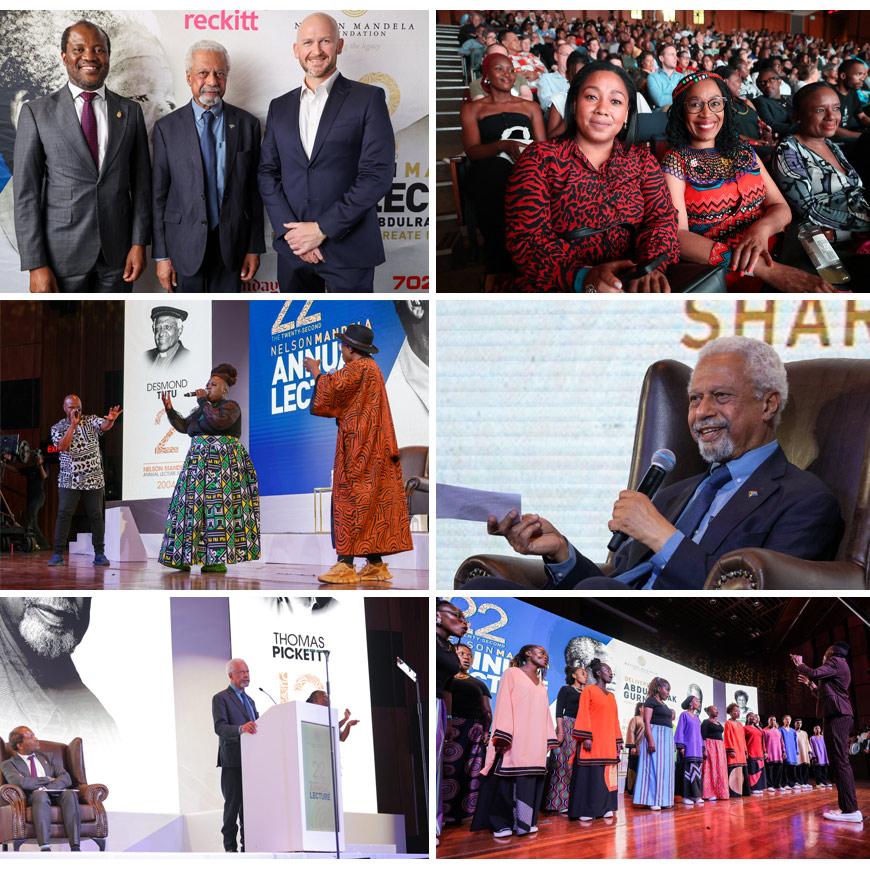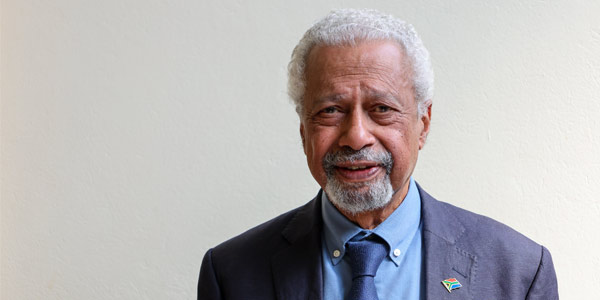There are times when words are all we have – Gurnah
- Wits University
Nobel Laureate Professor Abdulrazak Gurnah delivers the annual Nelson Mandela Memorial Lecture.
In remembering the impact of Madiba’s humanity, Gurnah championed words, story and literature as tools to build solidarity and strengthen the ideals of finding common ground.
The 22nd annual Nelson Mandela Memorial lecture was co-hosted by Wits University on 28 September. It marked both celebration of lessons embodied in Madiba’s legacy as well as a moment to reflect on Mandela’s connection to Wits, including being at one-time a law student at the university.

This year’s lecture was delivered by Zanzibar-born British author Abdulrazak Gurnah. In 2021 Gurnah was awarded the Nobel Prize in literature. His work includes his most recent book Afterlives, as well as Memory of Departure, Paradise, Gravel Heart and Admiring Silence. Gurnah was till his retirement, a professor of English literature and taught at the University of Kent.
Gurnah’s books have been lauded for using the power of storytelling to piercingly explore themes of colonialism, war, oppression, displacement and the experiences of loss, collective trauma and the human condition of heartbreak.
This year the Nelson Mandela Foundation chose the theme “Realising Our Shared Humanity”. The Foundation’s theme to Gurnah was to reflect on an ideal that “a sense of shared humanity means being committed to championing justice even if it goes against the interests of the rich or powerful, or even our own”.
Gurnah addressed a packed Linder Auditorium and a global online audience, beginning by highlighting the connecting points between the country of his birth and South Africa, and how South Africa first came to be part of his awareness as a 12-year-old schoolboy in Zanzibar in 1961.
“It was the year of our election and it was a time of unprecedented excitement as the politics of decolonisation were approaching a climax… But I remember crowding at the classroom windows watching as men chased each other up and down the street in front of the school, wielding clubs and throwing stones. This would become a regular and regrettable event for us and other African nations - when mistrust would make citizens suspicious of the rulers.
“What we did not know though allowed us to feel only the excitement. Part of the excitement was also because the politics and the campaign were continental, indeed global,” he said.
Gurnah said just the year before the Republic of Tanzania came into being with the unification of Zanzibar and Tanganyika, the horrors of the Sharpeville Massacre from the bottom of the continent in South Africa reverberated to his island home. The year 1960 though was also the year Albert Luthuli was awarded the Nobel Peace Prize. And one year after Tanzania’s independence Mandela visited the East African country, leading to the establishment of an ANC office in Dar es Salaam. 1962 though was also the year Mandela was arrested, signalling a brutal new turn in the Struggle and by 1964, Madiba’s incarceration would begin and span 27 years.
“Tanzania adopted Nkosi Sikelel’ iAfrika as national anthem with Kiswahili translation. And in a more prosaic way I came to know about South Africa because of a sense of solidarity that arose out of the decolonisation activities that led to boycotts of South African products. Suddenly South African orange juice disappeared from store shelves, as did various tin jams and fruits… South Africa had sailed into my vision and has remained there since then,” Gurnah said.
Decolonisation, he said, shrunk the world, allowing dread realities to be recognised, to be made real and for solidarities to form. He added: “War in Algeria, apartheid in South Africa, and the Civil Rights Struggle in the United States all seemed part of us. This solidarity derives in part from a shared experience of oppression under colonialism and racism, and I think it has endured and strengthened in the decades since then.”
That global endurance, Gurnah said, sustained South Africa’s long struggle to end apartheid. And he said a thread is pulled through this history to the present with South Africa’s decision to bring a case against Israel to the International Court of Justice in December 2023.
“Words will not rebuild destroyed schools and hospitals or end detentions or continued injustices taking place in the world,” he said. “But there are times when words are all we have - words and sympathy and understanding of our comparable experiences, our shared humanity.”

Gurnah said literature was the key he found as a teenager to open the doors to deeper understanding. He paused at the writings of South Africans, like Peter Abrahams’ Mine Boy, that he said was a revelation and gave him a “real inkling” of South Africa in the late 1960s.
Literature, he said, is using the vitality of story, of song, of dance to establish “the very existence of human community”. Literature, he went on, broaden minds, transmits news as information, perspectives and inklings and ultimately gives pleasure - a most human of experiences.
“Literature tells us about what we do know. It reassures us that our understanding of the world is shared, that how we feel is also felt by others,” he said.
As he concluded, Gurnah’s reminder was for struggles that still continue; of the unfinished work and therefore the need still to retrace the footsteps of giants like Madiba.
“Not everything has turned out well. What we have come to understand is that the consequences of colonialism are still with us and the consequences are various… but there is no option but to continue in hope that patience and resolution will enable a better future,” he said.
Gurnah’s memorial lecture marked the 25 year anniversary of the Nelson Mandela Foundation and a changing of the guard with Foundation stalwarts Professor Njabulo Ndebele, chairman of the Foundation and Verne Harris, director of archive and dialogue at the Foundation both retiring this spring.
Ndebele in his remarks spoke of the transitions at the organisation in the 25 years of existence. He said: “We have been though often painful processes of deep renewal that went on within the foundation, which have honed our social justice focus, reaffirmed our moral compass, deepened and anchoring in the legacy for which we carry such an intimidating responsibility.”
Wits University continues its responsibility to ensure Madiba’s legacy is upheld. It is through partnership, including with the Foundation, also in holding in trust archival material and working on digitising Madiba’s letters, notes and other works. Vice-Chancellor Professor Zeblon Vilakazi said in his remarks: “Nelson Mandela's journey is one of that intersects with the history of this great institution as he first walked in the halls of Wits University as a law student in the 1940s.
“We take pride in the fact that this university remains a custodian of many of the most significant records of his life.
“Our archival holdings include over 2 000 items that are related to Nelson Mandela, serving as a critical and invaluable resource and a wellspring for scholars, historians and activists alike,” Vilakazi said.
Wits University awarded an honorary doctorate to Mandela in 1991.

